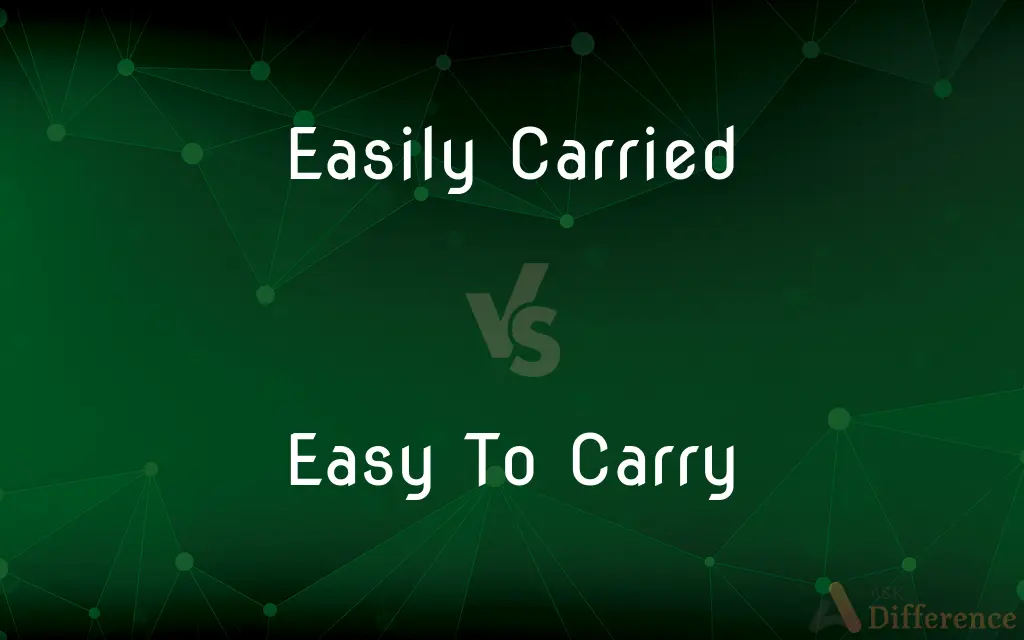Easily Carried vs. Easy To Carry — What's the Difference?
Edited by Tayyaba Rehman — By Fiza Rafique — Published on November 6, 2023
"Easily Carried" describes something that is currently being carried with ease. "Easy To Carry" describes the inherent quality of an item being convenient to carry. Both indicate portability, but their usage and context differ.

Difference Between Easily Carried and Easy To Carry
Table of Contents
ADVERTISEMENT
Key Differences
"Easily Carried" is a phrase that describes the act of carrying something without difficulty. When someone says an item is "easily carried," it implies that at that moment or in that context, the item is being transported without much effort. It's more about the action and the present condition. For instance, a bag that is full but lightweight might be "easily carried" by an individual.
On the other hand, "Easy To Carry" speaks more about the potential or the inherent characteristic of the item. This phrase doesn't necessarily describe the current action but rather the general nature or design of the object. A compact foldable chair, for example, has the trait of being "easy to carry" because of its design, even if no one is carrying it at the moment.
Both terms, "Easily Carried" and "Easy To Carry," revolve around the concept of portability. However, while "Easily Carried" is more situational, dependent on the action taking place, "Easy To Carry" is more static, describing a consistent attribute of an object.
Another distinction is in their grammatical structure. "Easily Carried" is an adverb followed by a past participle, suggesting a condition or state. "Easy To Carry," comprising an adjective and an infinitive, suggests capability or potentiality.
Lastly, both terms can be subjective. What is "easily carried" by one person might not be the same for another. Similarly, what's deemed "easy to carry" in one situation or for one purpose might not be for another.
ADVERTISEMENT
Comparison Chart
Grammatical Structure
Adverb + Past Participle
Adjective + Infinitive
Context
Describes current action/condition
Describes inherent quality
Subjectivity
Varies by situation
Varies by design or general perception
Usage
Describes items being carried easily
Describes items that are convenient
Temporality
Situational or momentary
Generally consistent
Compare with Definitions
Easily Carried
Not burdensome when transported.
The documents were easily carried in a single folder.
Easy To Carry
Not burdensome or heavy for holding or moving.
The water bottle is lightweight and easy to carry.
Easily Carried
Capable of being transported with little effort.
The lightweight materials made the structure easily carried.
Easy To Carry
Designed for convenient transportation.
The foldable bicycle is easy to carry on public transport.
Easily Carried
Moved without trouble or difficulty.
The small puppy was easily carried in her arms.
Easy To Carry
Suitable for effortless transport.
The inflatable mattress is easy to carry to camping trips.
Easily Carried
Convenient to transport due to size or weight.
The juice boxes were easily carried by the children.
Easy To Carry
Having qualities making transportation simple.
The compact design makes this laptop easy to carry.
Easily Carried
Not causing strain when held or moved.
The backpack was packed efficiently and was easily carried.
Easy To Carry
Characterized by convenience in handling or bearing.
The ergonomic handles make this tool easy to carry.
Common Curiosities
Is "Easily Carried" an action or a trait?
It's more about the action or the state of being carried with ease.
Can both terms be subjective?
Yes, what is "easily carried" or "easy to carry" for one might not be for another.
Can a heavy item be "easy to carry" due to its design?
Yes, ergonomic design can make a relatively heavy item "easy to carry."
Can something be "easy to carry" but not "easily carried" in a situation?
Yes, context matters. An "easy to carry" item might be packed improperly, making it not "easily carried" at the moment.
Does "Easy To Carry" mean an object is always light?
Not necessarily. "Easy To Carry" refers to convenience, which can be due to size, design, or other factors.
Which term is more about potentiality?
"Easy To Carry" is more about the potential or inherent quality.
Which term suggests capability?
"Easy To Carry" suggests capability or potentiality.
Is "Easily Carried" passive in structure?
Yes, it's formed using an adverb and a past participle.
Is "Easily Carried" about the current state?
Yes, "Easily Carried" often refers to a current condition or situation.
Can both terms be used interchangeably?
Not always, as they have nuanced differences in meaning and context.
Does "Easy To Carry" imply a consistent attribute?
Generally, yes. It describes a consistent or inherent trait of an object.
Can both terms relate to emotional burdens?
Metaphorically, yes. One might have a secret that's "easily carried" or "not easy to carry."
How are these terms typically used in daily language?
They are often used to describe objects or burdens in terms of their transport convenience.
Which is more about design quality?
"Easy To Carry" often emphasizes design or inherent quality.
Share Your Discovery

Previous Comparison
Xbox vs. PlayStation
Next Comparison
Sea Star vs. StarfishAuthor Spotlight
Written by
Fiza RafiqueFiza Rafique is a skilled content writer at AskDifference.com, where she meticulously refines and enhances written pieces. Drawing from her vast editorial expertise, Fiza ensures clarity, accuracy, and precision in every article. Passionate about language, she continually seeks to elevate the quality of content for readers worldwide.
Edited by
Tayyaba RehmanTayyaba Rehman is a distinguished writer, currently serving as a primary contributor to askdifference.com. As a researcher in semantics and etymology, Tayyaba's passion for the complexity of languages and their distinctions has found a perfect home on the platform. Tayyaba delves into the intricacies of language, distinguishing between commonly confused words and phrases, thereby providing clarity for readers worldwide.
















































